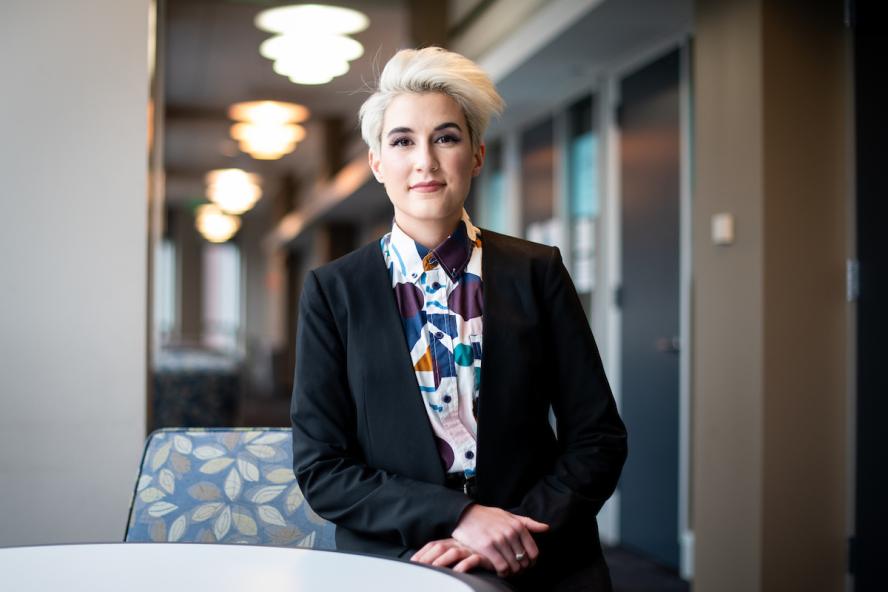-
About
- Departments & Offices
-
Academics
- Public Health
- Biomedical Sciences
- Physician Assistant
- Special Master’s (MBS)
-
Admissions & Financial Aid
- Tuition & Fees
-
Student Experience
-
- Student Resources by Program
- Academic & Student Support
- Wellness & Wellbeing
- Student Life
- Events & Traditions
-
-
Research
- Research Labs & Centers
- Tufts University-Tufts Medicine Research Enterprise
-
Local & Global Engagement
- Global Health Programs
- Community Engagement
Community Building in the Emergency Room
The pandemic helped affirm Courtney Hibbs’ interests in emergency care, public health, and mental health

Courtney Hibbs, M21, leaves her time at Tufts even more committed to her passions of community building and public health, in part due to the pandemic that hit during her penultimate year at the School of Medicine.
The pandemic afforded her a silver lining to work on the types of public health issues that affect people she cares most about: marginalized and vulnerable populations.
“I wanted to be able to contribute as much as I could,” said Hibbs, who was pulled out of her last week of a surgery rotation when the pandemic initially shut down most of the Northeast in early March 2020. Hibbs ended up working in the Boston Hope field hospital, which opened in April 2020 in the Boston Convention and Exhibition Center. It served patients recovering from coronavirus infections as well as people who had the virus and were unsheltered, or homeless.
She and the other Tufts medical students were tasked with overseeing health care workers and anyone else entering the hospital as they put on or took off personal protective equipment (PPE). Hibbs created a curriculum for proper donning and doffing of that PPE to minimize risk of exposure to the virus.
Hibbs will be doing her residency in emergency medicine, a stressful specialty she feels prepared for, in part, from having grown up with parents who both struggled with addiction.
“I thrive in intense situations because I had to as a kid,” Hibbs explained. “I grew up where I had to survive every day of my life.”
That background gives Hibbs a compassion and empathy that has been noticed by her professors and peers. During one of her emergency medicine rotations, Hibbs said she was the go-to person to help when patients were distressed.
“Whenever there was a patient who was struggling with something, or there was a very emotionally intense clinical appointment or procedure, they would always call me in to be there for the patient,” she said. “I was very good at building a rapport with patients and being supportive of them.”
Compassion is interwoven with mental health, Hibbs pointed out, with self-compassion being particularly important for people in demanding environments like medical school. She said she would tell incoming TUSM students that it’s important to focus on their own mental health.
“You can’t take care of your patients if you’re not taking care of yourself and making that a priority as well,” she said. Her strategies included cutting herself off from studying by a certain time each day and leaving room in her schedule for exercise.
Of her upcoming residency, Hibbs said working in the ER at Carilion Memorial Roanoke Hospital, which is associated with Virginia Tech, is appealing for a couple of reasons. First, she likes the hospital’s commitment to the surrounding community.
“They invest a lot in preventative medicine and really improving healthcare outcomes. They’re able to expand healthcare coverage to the entire community,” she said, adding that the hospital often works with patients who don’t have insurance.
And because the ER is often the first point of care for the most vulnerable populations, she’ll be in a unique position to help. “I’m rebuilding trust, or creating it when there hasn’t been any,” said Hibbs. “I can link patients to resources and do research to see how we can better help these communities.”